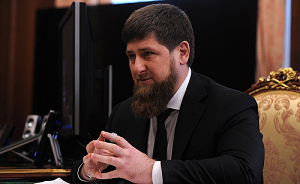Attacks in Chechnya Suggest Opposition to Kadyrov is Far from Eradicated
By Emil Souleimanov
March 24, 2017, the CACI Analyst
At the turn of 2016 and 2017, events took place in parts of Chechnya that again challenged the triumphant statements of local pro-Moscow and federal authorities that the jihadist-inspired insurgency in this North Caucasian republic was eradicated. Aside from illustrating the latent character of armed conflict in the region in general and in Chechnya in particular, the recent upsurge of violence in Chechnya contains particularities that may have far-reaching consequences. Sporadic attacks against the Kadyrov regime will likely recur in the years to come and intensify should the regime’s grip on power weaken. 
Russia recalibrates 201st base in Tajikistan
By Roger N. McDermott
February 25th, 2016, The CACI Analyst
Moscow has stated that among its defense and security priorities for 2016, Central Asia and the South Caucasus will top its agenda. Kavkaz 2016, the main strategic military exercise of the year, will take place in the Southern Military District (MD), while Tsentr 2015 occurred in Central MD with among its vignettes a rehearsal of intervention in Central Asia. Surprisingly in this context, the Defense Ministry plans to restructure the 201st Base in Tajikistan from divisional to brigade status. This initiative is driven by Moscow’s growing concerns about the future of Central Asian security as it faces multiple potential threats stemming from Afghanistan and Islamic State (ISIS). But paradoxically, Moscow’s latest moves to strengthen the basing of its forces in Tajikistan serves as an indicator of official perceptions that the region could suffer a serious security challenge.
Violence in Tajikistan emerges from within the state
By Edward Lemon
September 23rd, 2015, The CACI Analyst
Rather than resulting from external factors, as the regime has argued, the recent violence in Tajikistan erupted from within the state itself. Elites within the Tajik state continually compete for political influence and economic gain. These struggles occasionally break out into violence. Ironically, such conflicts are actually useful for the regime. They allow it to legitimize a purge of potentially disloyal members and a crackdown on other opponents. By blaming the latest conflict on the country’s leading opposition party, the Islamic Renaissance Party (IRPT), the regime legitimized its move to ban the party and arrest its leading members.
A weakened insurgency precludes IS inroads to the North Caucasus
By Emil Aslan Souleimanov (09/02/2015 issue of the CACI Analyst)
Recent months have seen North Caucasian amirs pledging allegiance to the terrorist group calling itself the Islamic State (ISIS). Many have pointed to this process as a sign of the changing paradigm of the regional resistance, which is being transformed into – or absorbed by – the global jihadist insurgency. But these assumptions can be challenged by a look at the internal dynamics, the distance from key hotbeds of jihadist violence, and the limits of the North Caucasian insurgency. While ISIS may have some impact on the North Caucasian jamaats, it is likely to be rather limited and indirect.
CACI Analyst, April 29, 2015
Contents
Analytical Articles
RUSSIA'S REGULATION OF LABOR MIGRATION SET TO HURT CENTRAL ASIAN ECONOMIES, by Nurzhan Zhambekov
MOSCOW CFE KILL THREATEN CAUCASUS STABILITY, by Richard Weitz
CAUCASUS EMIRATE FACES FURTHER DECLINE AFTER THE DEATH OF ITS LEADER, by Emil Aslan Souleimanov
KAZAKHSTAN AND NEIGHBORS SEEK STRATEGIES TO COUNTER EMERGING THREATS, by Jacob Zenn
Field Reports
KYRGYZSTAN'S PRIME MINISTER RESIGNS, by Arslan Sabyrbekov
ISLAMIC STATE REACHES OUT TO GEORGIA, by Eka Janashia
ARMENIA'S PRESIDENT VISITS THE VATICAN, by Erik Davtyan
AZERBAIJAN DEMOTED TO EITI CANDIDATE, by Mina Muradova






